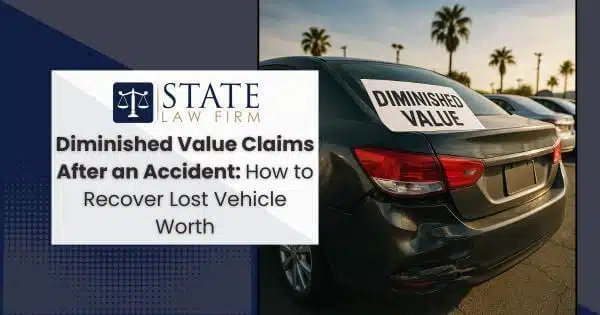When your car is involved in an accident, the damage goes beyond dents and repairs. Even after it’s fixed, your vehicle may lose market value simply because it now has a collision history. This is known as diminished value, and it can result in thousands of dollars in lost value when it’s time to sell or trade in your vehicle. A Carfax study found that even well-repaired cars lose an average of $500 to $2,100 in value after an accident, regardless of the severity of the damage.
Unfortunately, many drivers never recover the lost value because they don’t know they have the right to file a diminished value claim, or they encounter insurance roadblocks. At State Law Firm, our attorneys are committed to helping clients in Sherman Oaks and throughout California fight for every dollar they’re owed, not just for medical bills, but for property losses that can quietly add up.
In this guide, we’ll walk you through everything you need to know about diminished value claims: what they are, how they’re calculated, and how to file one with confidence. We’ll also break down common challenges and how to overcome them, whether you’re going toe-to-toe with an insurance adjuster or navigating the paperwork after your accident. And if you haven’t already retrieved your police report, here’s how to obtain a California accident report—a critical piece of documentation for your claim.
Understanding Diminished Value: What It Means for Your Vehicle After an Accident
Even after your car has been fully repaired following an accident, its value may not always return to its normal level. That’s because any vehicle with a history of damage—no matter how expertly fixed—is considered less valuable in the resale market. This loss is known as diminished value and is often overlooked in the claims process.
Some buyers will walk away from an otherwise great car just because an accident shows up on the Carfax report. Others may use the history as leverage to push down the price. Either way, you lose—unless you take action.
Pro Tip: If your car is less than five years old, has low mileage, and the accident wasn’t your fault, you may have a stronger claim for diminished value.
Types of Diminished Value: Recognizing the Different Categories
Diminished value comes in different forms, and knowing which applies to your situation is key to getting compensated fairly:
- Immediate Diminished Value – The theoretical loss in value before repairs are made.
- Inherent Diminished Value – The most commonly claimed form; refers to the loss in resale value due to accident history, even if repairs are perfect.
- Repair-Related Diminished Value – Applies when repairs are incomplete, visible, or use substandard parts.
In California, inherent diminished value is the most relevant and easiest to argue, as resale value is routinely affected by the mere disclosure of the accident alone.
The Process of Filing a Diminished Value Claim: Step-by-Step Guide
Here’s how to file a diminished value claim and improve your chances of getting a fair payout:
- Complete the vehicle repairs. Insurers won’t evaluate diminished value until repairs are finalized.
- Gather your documentation, including:
- Repair invoices
- Pre- and post-accident photos
- Vehicle history reports (Carfax, AutoCheck)
- Appraisals (optional but helpful)
- Calculate the estimated diminished value (see next section).
- Submit a demand letter to the at-fault party’s insurer, including your estimate and supporting documents.
- Negotiate with the adjuster and follow up persistently.
Real-World Insight: Reddit user “Fiasko21” successfully filed a diminished value claim by comparing KBB values for his mint-condition car versus one with an accident history. Geico paid him $1,800 after reviewing the claim, without requiring a formal appraisal.
Calculating Diminished Value: Methods and Tools You Can Use
You don’t always need a paid appraiser. Many car owners have succeeded by using free tools and common sense:
- Use Kelley Blue Book (KBB) or NADA Guides to compare your car’s value before and after the accident.
- Review comparable listings on sites like CarGurus or Bring a Trailer to see how similar vehicles are priced based on their condition and accident history.
- Some use the 17c Formula, an older insurance method that multiplies pre-accident value by .10, then adjusts for mileage and severity. Insurers may try to lowball you using this, so use it cautiously.
Pro Tip: Consider using a diminished value report service that charges a fee only if you win your claim. That way, there’s no risk on your end.
The Role of Insurance Companies in Diminished Value Claims: What You Need to Know
Many insurers don’t advertise that you can file a diminished value claim, because they’d rather you didn’t.
Expect challenges like:
- Lowball offers (e.g., 5% loss estimates)
- Claims that your vehicle lost “no value”
- Requests for extensive documentation or proof that you’ve sold the vehicle
Reddit users noted that just mentioning “diminished value” can be enough to prompt an offer from the adjuster. Don’t be afraid to ask. If you’re unsure where to begin, our team at State Law Firm can assist you in drafting a demand letter and guide you through what to include.
Common Challenges in Diminished Value Claims and How to Overcome Them
Here are the most common hurdles—and how to clear them:
- Insurer denies value was lost: Push back with market comps, appraisal reports, or personal calculations.
- No structural damage argument: Point out that accident history alone affects Carfax and resale value.
- Complex negotiations: Stay calm and persistent, or let a personal injury attorney handle the heavy lifting.
✅ Pro Tip: You don’t need to sell your car to prove diminished value. All you need is credible evidence that its market value is lower now than it was before the crash.
Take Action Today to Secure Your Fair Compensation
You paid for your car with your hard-earned money. You deserve to recover every dollar of its worth, not just what it takes to make it drivable again. Whether you’re preparing to file a claim or simply want help evaluating your case, State Law Firm is ready to advocate for you.
If you were involved in an accident in California, make sure to obtain a copy of your police report and reach out to our team. We’ve helped countless clients recover more than what the insurance company initially offered—and we’re ready to do the same for you.


